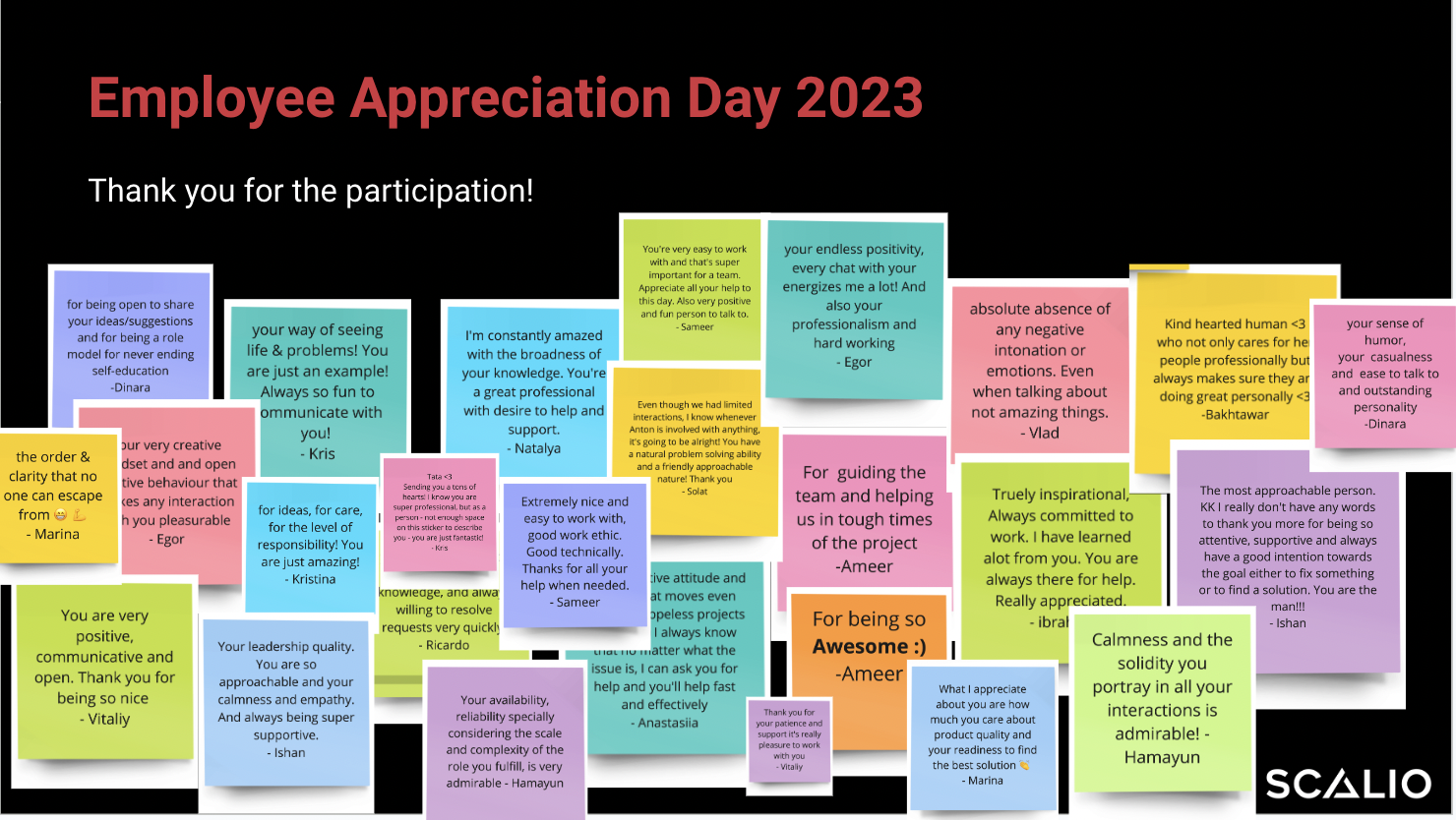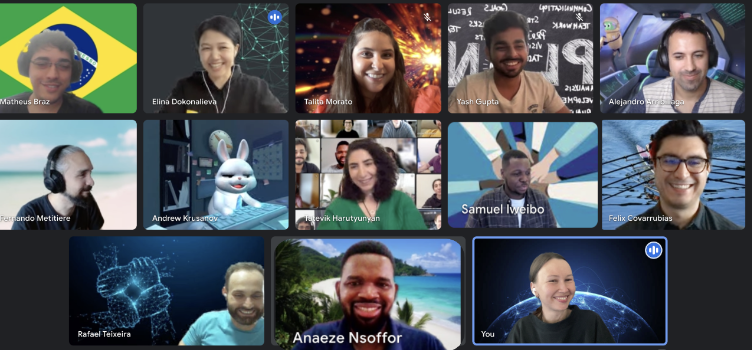
Human Resources
Engagement and Collaboration in the Digital Era

 Dinara Kovalenko - HR Specialist
Dinara Kovalenko - HR Specialist
Introduction
In today's digital era, how well organizations harness the power of engagement and collaboration with their team members is more important than ever. As the demand for remote work shifts office dynamics, businesses need to stay on top of their game if they want to stay ahead of their competition. In this blog article, we would like to explore Scalio's journey of success in the remote work era and share some useful tips for future success in engaging and motivating distributed teams. We hope these insights will help you find new ways of becoming an even more inspired and productive organization.
But first, what does the term “engagement” mean? From an article by HBR, employee engagement includes four elements. It consists of the degree to which a team member:
- Feels committed to an organization
- Identifies with an organization
- Feels satisfied with their job
- Feels energized at work
"Engagement” refers to the emotional commitment and involvement your team has with their work, colleagues, and company. While remote work has benefits and is here to stay, it also poses unique challenges for keeping personnel engaged.
Benefits
Staff engagement has risen to the top of most businesses' priority lists, and here's why:
- Decrease turnover rate. According to the Gallup State of the American Workplace Report, in organizations with high turnover rates, business units that are highly engaged experience a 24% decrease in turnover. Even in low-turnover organizations, the gains are significant, with highly engaged business units experiencing a 59% decrease in turnover. When your workforce is engaged, they tend to stay with the organization longer, reducing turnover costs and increasing organizational stability.
- Increase productivity. While working remotely, team members may experience a sense of loneliness and detachment from their coworkers and the company's objectives. Nonetheless, active and committed personnel outperform their peers. According to the Gallup report, companies can achieve several benefits by fostering a culture of engagement, including a 10% increase in customer satisfaction ratings, 17% higher productivity, 20% more sales, and 21% higher profits.

- Improve morale. When staff are fully committed to their work, they tend to perform at their best. They are driven to exceed their regular responsibilities, contributing more to the company's success. According to Gallup's research on Employee Engagement vs. Employee Satisfaction and Organizational Culture, highly engaged business units experience an 81% decrease in absenteeism.
- Personnel are more likely to act as advocates. Engaged personnel tend to be more enthusiastic about their work and the company they work for. Teammates can become brand ambassadors for their organization, sharing their positive experiences with others and helping to create a positive image of the company. Therefore, fostering staff engagement can have a ripple effect throughout the organization, boosting retention rates, ensuring stability, and even attracting new talent.
According to Gallup’s report, a mere one-third of workers are engaged. This finding should raise a red flag for most organizations. If you are not confident that the majority of your workforce is engaged, you could face costly consequences.
Challenges
Despite the benefits of employee engagement in remote teams, there are several challenges that IT companies face in engaging their personnel. As a company with team members working remotely from 25 countries, we've learned a lot about the power of engagement and how it can help us navigate through the challenges and reap the benefits of remote work.

One of the biggest challenges has been managing time zones and communication across different locations. Remote teams often rely on technology to communicate, which can lead to miscommunication and a lack of connection between team members. In addition, remote personnel may feel isolated and disconnected from their colleagues and organization, particularly if they are working in a different time zone or with unfamiliar cultures. We've had to adapt our schedules, workflows, and tools to ensure that everyone can collaborate effectively and efficiently.
The next challenge we faced was that Scalio has grown (103% in 2022, to be exact!), and maintaining that initial sense of engagement has become more challenging. The transformation from a small company to a larger one has again required us to adapt and find new ways to ensure everyone remains connected.
Another challenge has been recognizing that some teammates may be introverted and prefer asynchronous communication, while others may be extroverted and thrive on social interaction. To address this, we've tried to create a flexible and inclusive culture that values individual strengths and preferences.
In times of difficulty with employee engagement, HR plays an important part in aiding the organization to tackle such concerns and promote a healthy work culture. HR ensures that all members of the team can partake by establishing an inclusive and inviting atmosphere that encourages everyone to share their thoughts. HR chooses easy-to-use tools and technology for remote engagement and assesses the success of activities to collect input for enhancement while constantly exploring new strategies tailored to their team's needs.
Tips
Scalio is a digital product agency that has been working remotely since its inception. The company has implemented several techniques to foster employee engagement, which have proven to be successful. Some of the most effective techniques used by Scalio are:
- Express gratitude and appreciation. It is crucial to show recognition and gratitude as it holds immense value for most individuals. To commemorate International Appreciation Day, we arranged a unique event where team members had the chance to express their appreciation towards each other. We set up a Miro board where team members could leave genuine messages and notes for their peers, commending their hard work and commitment. We were very pleased to see that 90 percent of them rated the event 5 out of 5.

- Hold Happy Hours on Fridays. One effective way to boost team morale and foster positive relationships among colleagues is to organize Happy Hours on Fridays. These events provide a fun and low-pressure environment to socialize and unwind after a long workweek. Colleagues can engage in non-work-related conversations and get to know each other on a personal level, improving communication and collaboration within the team. To facilitate remote Happy Hours, various tools can be used, such as Crowd Party, Miro Board, and Gather Town, which offer engaging experiences and customizable templates. Overall, Happy Hours can be a popular and effective activity to promote a positive team dynamic.

- Engage the team in monthly All Hands. Conducting monthly All Hands meetings is crucial for two main reasons. Firstly, it provides an opportunity to gain insight into the company's current state and the difficulties we are encountering. Secondly, it fosters a sense of belonging and fellowship, especially for those who may feel detached. It is imperative to involve the team in these meetings to ensure that everyone is on the same page and feels connected.
- Encourage a healthy and inclusive environment. To promote a healthy and inclusive environment, it is crucial to prioritize the physical, mental, and emotional health of your team. This not only benefits your staff but also leads to increased productivity, reduced absenteeism, improved mental health, enhanced employee engagement, and a positive employer brand. Our approach includes holding regular 1:1 meetings with leadership and HR, where we actively listen to teammates’ feedback and address any concerns or challenges to build trust with the team. Additionally, we have a fair vacation policy that encourages time off to prevent burnout and support work-life balance. We urge our team to plan their vacations in advance to ensure everyone has the opportunity to recharge their batteries. Another way to promote a healthy work environment is through health challenge activities that foster teamwork and encourage healthy habits such as drinking enough water, getting regular exercise, and getting sufficient sleep. These habits can enhance the overall health and well-being of teammates while also improving productivity and energy levels.
- An Internal Interview with the Scalio Team. By conducting regular interviews among team members, we encourage them to share their culture, hobbies, motivation, and must-visit tips, among other things. These interviews help break down barriers between colleagues, foster collaboration and communication, and encourage teammates to learn more about each other. We schedule internal interviews to take place every month and have received a lot of positive feedback from other team members who enjoy reading about their colleagues.
- The Buddy Program is an exceptional initiative that fosters a sense of community and support within the workplace. With the buddy program, new team members are no longer left to navigate the workplace on their own, but instead, they are paired with a more experienced colleague to guide, support, and help them. The program helps new teammates feel more confident and connected to the company, which eventually leads to increased engagement. Overall, even though the program’s main goal is onboarding, it also has a significant impact on engagement over the long term.
- Create Meet The Team/ Spotlight LinkedIn posts. When employees are featured in "meet the team" posts, it can help them feel recognized and valued. These posts should focus on showcasing their skills, accomplishments, and personal interests, which will emphasize their valuable contributions to the company.

- Scalio Talks is a learning and development opportunity that we offer. It is a monthly internal activity that we have introduced, where any member of the team can volunteer to be a speaker and share a topic of interest with other team members. This provides an excellent platform for exchanging ideas, discovering common interests, and encouraging each other in new pursuits. It is an optional and flexible activity that accommodates a diverse range of topics.
- Share Swag Stores. Introducing your remote team to a swag store is a great way to boost team morale and create a sense of unity, even when miles apart. This allows team members to showcase their loyalty to the company and develop a collective experience. Moreover, wearing company-branded merchandise enables remote workers to endorse the company's brand and values, which is particularly crucial for them as they might not have many chances to connect with the company culture. Overall, a swag store can be a straightforward yet efficient approach to establishing a positive team dynamic and promoting a shared sense of identity among remote workers.

Conclusion
In conclusion, employee engagement is a critical aspect of remote work that should not be overlooked by businesses. Engaged teams tend to be more committed, efficient, and likely to remain with the organization in the long run. However, remote work poses unique challenges to personnel engagement, such as communication barriers and isolation. Therefore, businesses need to adapt and innovate to keep their personnel engaged and motivated. This can be achieved by fostering a flexible and inclusive culture that values individual strengths and preferences, utilizing user-friendly tools and technology, and actively seeking feedback from colleagues. By implementing these tips and adopting a proactive approach to staff engagement, businesses can maximize the benefits of a highly engaged workforce.
Remember, it is important to keep in mind that the key to effective remote engagement is to continuously experiment with different approaches and determine what works best for your team. By consistently practicing and refining your strategies, you will become proficient at engaging remote teams and enjoy the resulting benefits.



